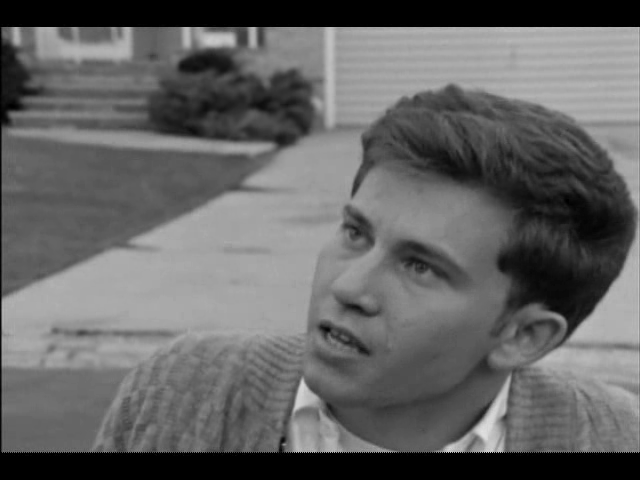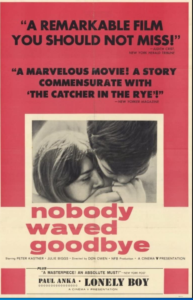|
Genres, Themes, Actors, and Directors:
- Canadian Films
- Coming of Age
- Juvenile Delinquents
- Teenagers
Review:
Canadian filmmaker Don Owen was originally tasked with making a 1/2-hour documentary about juvenile delinquents for Canada’s National Film Board, but ended up filming this largely improvised cinema verite docudrama instead. Reminiscent of Cassavettes (though Owen himself has noted a distinct difference between their two styles), Nobody Waved Goodbye is an indie variation on Rebel Without a Cause (1955), with Peter Kastner’s “Peter” longing for something indescribably more than his own parents’ comfortable middle class lifestyle. He’s a clean-cut pseudo-Beatnik (indeed, he attends sing-along “hoots” with his banjo in tow) who’s seemingly ripe for a 1960s hippie lifestyle, but without a viable counterculture readily waiting for him; instead, he plays hooky from school with his sweet girlfriend (Julie Biggs), resists studying for his senior exams, toys with petty crime, and eventually moves away on his own. Naturally, he quickly learns how challenging it can be to survive in the world without a degree or any experience — but easy answers to his existential dilemma aren’t forthcoming. Nobody Waved Goodbye remains a noteworthy entry in Canada’s film history, and is worth seeking out for one-time watching.
Note: Twenty years later, Owen made a follow-up film called Unfinished Business (1984), which I haven’t seen, but a lone poster on IMDb gives it a disappointing thumbs down.
Redeeming Qualities and Moments:
- Peter Kastner as Peter

- The cinema verite script

Must See?
No, though most film fanatics will likely be curious to check it out.
Links:
|



One thought on “Nobody Waved Goodbye (1964)”
Not a must.
Hadn’t seen this before but yikes! Ultimately unsatisfying and pointless. Great pains are taken (and given) in setting up a one-note situation in which there’s a lot of bickering among people not inclined toward real communication who are, nevertheless, rather demanding of one another. ~which, I suppose, *is* the point of the thing, but it goes nowhere.
Kastner (somewhat endearing in Coppola’s ‘You’re A Big Boy Now’) is simply annoying here – as is Biggs (who may come off a bit sweet at first but turns shrewish when she should just realize she’s with an idiot and dump him; by staying with Kastner, she takes on the shrill characteristic of his mother).
More frustrating than anything else since the film has very little on its mind.